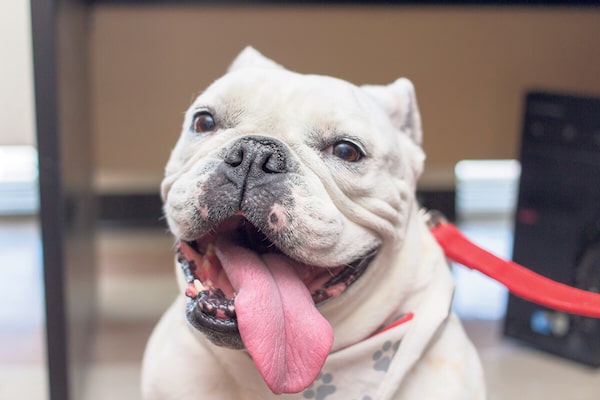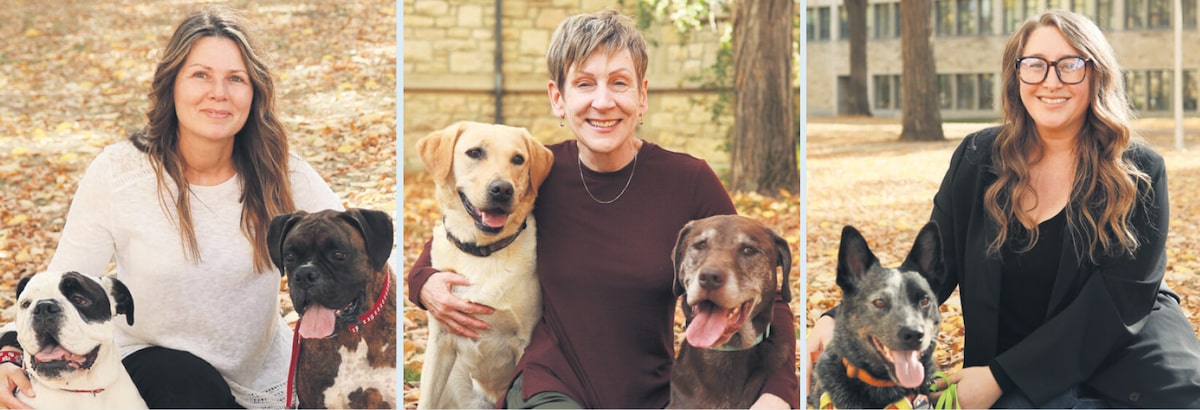
Bulldog Anna-Belle inspired a prisoner to give his life a new direction.Supplied
When Xavier met Anna-Belle, his posture suggested he wasn’t ready for a relationship. His eyes obscured by sunglasses, his arms crossed, his skin hidden under extensive tattoos: all suggested he was unapproachable. Yet Anna-Belle was undeterred, and after a day and a half, Xavier (not his real name) considered her family.
It may sound like an unlikely bond – between an inmate serving time in a Canadian prison and an exuberant bulldog – but Colleen Dell has seen such scenarios repeated over and over again in a number of settings, from prisons and addiction treatment centres to psychiatric institutions, emergency wards and hospices.
As a leading Canadian public sociologist, animal-assisted intervention practitioner and professor in One Health and Wellness at the University of Saskatchewan, Dr. Dell conducts research aimed at advancing our understanding of the human-animal connection.
“We met Xavier as part of a canine-assisted intervention for prisoners,” says Dr. Dell, who explains that the program started with a call from the warden, who said, “People are dying in here; we need to do something more. Can you come with the dogs?”
Learning that a number of prisoners had overdosed, Dr. Dell and her colleague Darlene Chalmers developed a five-day program that resulted in Anna-Belle becoming what Xavier called “his little sister.”
Then, in one of the visits, “we were alarmed to learn that Xavier was in solitary confinement and wouldn’t be able to see Anna-Belle,” says Dr. Dell. “We asked the assistant warden and he agreed that they could have 10 minutes together.”
After Anna-Belle was led away by her colleague to see Xavier, 10 minutes passed, then 20, returning only an hour later, she recalls. “Seeing them together – with Xavier in shackles and Anna-Belle soaking up the attention – the guard couldn’t bring himself to separate them after only 10 minutes.”
Can such powerful yet fleeting encounters lead to lasting life changes? “Absolutely. When this kind of bond happens, especially to those who are the most disconnected in our society, that is so beautiful and pure – and very real,” says Dr. Dell. “Prisoners have told me that their connection with the dogs stays with them always. One inmate, who always keeps a photo of the dog close by, told me, ‘Every day, I look at that picture, so I won’t take my life.’”
Beyond helping marginalized community members, human-animal connections can benefit almost everyone, and Dr. Dell learned this through personal experience. “I was working in social justice, including mental health and addiction, a field that can be very difficult, especially when you don’t see a lot of movement,” she says. “Then I got a dog, and then another, and I gained this clear awareness of what they bring to our lives.”
This transformative impact on her own well-being inspired Dr. Dell to pivot her research direction. The goal? To learn how such powerful benefits can be realized without detrimental consequences and, at the same time, bring hope to vulnerable community members.
“Back then, there weren’t many studies on the human-animal bond available, and we learned a lot through experience,” says Dr. Dell, adding that while she and her colleagues in the PAWSitive Connections Lab made considerable progress in studying the dynamic relationship between people and animals, one important tenet has stayed the same: the focus on animal welfare.
“The more we acknowledge that dogs are important to our health and happiness, the more we’ll want to reciprocate by taking good care of them,” she says. “We, as a society, need to recognize that dogs are not objects to be used for our wellness; they are sentient beings.”
Dr. Dell pays close attention when she brings program dogs into environments that may be stressful for them. “At the hospice, for example, the setting can be very sad, but it can also be peaceful and beautiful,” she says. “Just like people, there are particular dogs who can do this kind of work.”
Encountering new people happens frequently during the twice-a-month visits. Recently, Dr. Dell decided to leave the itinerary up to Molly, another bulldog, who headed straight for the room housing one person who was still here from her previous time.
What followed was a joyful reunion and a renewed sense, for Dr. Dell, “that there are other ways of knowing and being. When we recognize this, it can enrich our lives.
“Every single day, I learn something from my dogs,” she says, and the insights can be surprising. Take the bond between Xavier and Anna-Belle, for example. Many years after their first meeting, the team was pleased to hear that Xavier had finished high school.
“We stay in regular contact with the participants through letters and photos. Just last month, we got an email from his parole officer asking for a video conference. We learned that Xavier went out on a work release and did really well,” says Dr. Dell. “That’s quite a change from the beginning, when everyone said he would never, ever see the outside of the prison.”
When Xavier was asked about the catalyst for this change, he said, without hesitation, “It’s because of the patience I learned from Anna-Belle.”
Dr. Dell laughs. “Patience? From Anna-Belle? Indeed, I have always seen her as full of love but also strong-willed at times. Somehow, she just seemed to know exactly what was needed.”

DISTANTIDES PHOTOGRAPHY
Researchers join forces to advance both theory and practice in support of animal-assisted interventions
ABOUT THE INITIATIVE
Bringing together Dr. Colleen Anne Dell (left), Department of Sociology and School of Public Health at the University of Saskatchewan (USask); Dr. Darlene Chalmers (centre), Faculty of Social Work at the University of Regina; and Dr. Linzi Williamson (right), Department of Psychology and Health Studies at USask, the PAWSitive Connections Lab is dedicated to exploring interactions between animals and people, with particular emphasis on the power of connection between animals and individuals recovering from addiction and mental health.
Advertising feature produced by Randall Anthony Communications. The Globe’s editorial department was not involved.